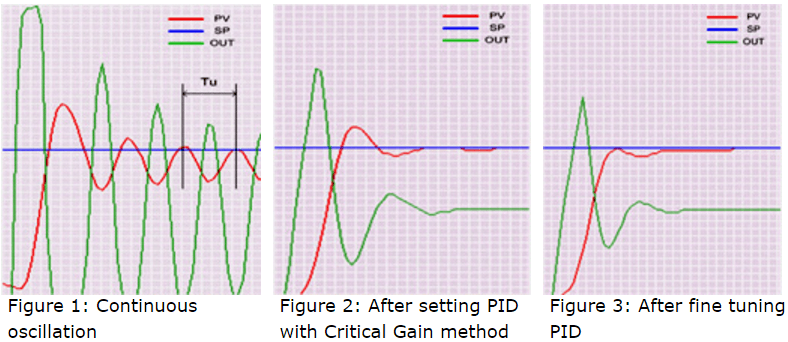Though a variety of methods have been discovered for automatically tuning PID parameters, there are thought to be many cases in which adjustments can be made manually based on experience. The following is a procedure for manual tuning of the PID parameters that form the foundation of PID control. The method introduced here is the most well-known, the Ziegler-Nichols Critical Gain method.

Procedure
- In proportional control mode, narrow down the proportional band from a sufficiently large value to determine the proportional band (critical proportional band PBu) and period of oscillation (critical period Tu) at which the response is a continuous oscillation of a uniform amplitude. (Figure 1.)
- From that value, calculate the PID parameter using table 1, and check the control operation. (Figure 2)
- Watching the control results, finely tune the PID parameter to the optimum value. (Figure 3: Example with proportional band set somewhat large)

Notes
The examples given above are relatively common uses for manual PID parameter tuning, but this tuning method may not be optimal for all processes. In particular, when applying to PH control, reaction canister control, and other processes with a high degree of non-linearity, extra care must be taken since the control output can fluctuate greatly when changing the PID parameter, and the controlled objects (temperature, current, pressure, etc.) may change dramatically.
This Method is given by Yokogawa & so mainly applied to Centum Vp DCS.
Also Read: PID Controller Selection Guide
Muito obrigado pelo artigo,,o melhor site de instrumentação que eu conheço…sou do Brasil e aqui não existe site que ajuda a entender a instrumentação como esse,,continua a nós ajudar a compartilha o seu conhecimento e nós tornando seus dicipulos..
Translated : Thank you very much for the article, the best instrumentation website that I know … I’m from Brazil and here there is no website that helps to understand the instrumentation like this, continues to help us, share the knowledge.